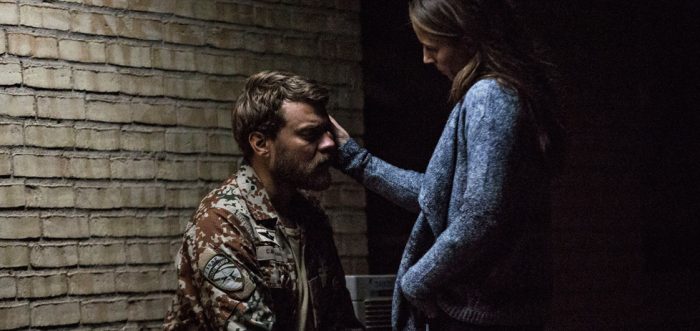
Tobias Lindholm moves through familiar terrain in his latest film-as-ethical-dilemma, A War (Danish: Krigen). Like 2012’s A Hijacking before it, Lindholm presents contrasting worlds and attitudes through dueling narrative strands; the earlier film sets the horrors of being held captive by Somali pirates alongside the hostage negotiations underway in a corporate office in Denmark, A War has the activities of a Danish platoon in Afghanistan intercut with scenes on the home front, a company commander’s wife raising their young children in his absence. It’s a predominately dry affair, Lindholm matter-of-factly moves through the motions of grappling with a slightly errant child and the complex nature of leadership in the armed forces. Even the sniping of a suspected insurgent is presented as the logical conclusion of protocol. This focus on protocol and order is what holds the film together, though, giving its eventual clash of human decision-making and legal ramifications a stronger sense of even-handedness.
Pilou Asbæk (best known for his work in Borgen and, less so, his co-hosting duties at the 2014 Eurovision Song Contest) gets run through the ringer once again, Lindholm moves him from a captured cargo ship to the war-torn Helmand province as company commander Claus Michael Pedersen. Though he’s stationed at a base directing his men on patrol, after the brutal IED-triggered death of a soldier he puts himself on the front lines. Back in Denmark, his wife Maria (a brilliantly measured Tuva Novotny) copes with temporary single-parenthood as two of her young children act out, struggling themselves with having to wait months to see their father. The distance between them is threatened once again when Claus is suddenly sent back to Denmark to face trial on charges of committing a war crime.
The pacing is slow and measured, all geared towards the final courtroom-set moments, which raises a larger query as to the true purpose of the war sections, whether they serve as an extended set-up for the visual realisation of an unnerving ethical hypothetical or stand on their own as a sobering portrait of war. Unfortunately it tends to be more of the former; filmed in Turkey and Spain, the combat sections of the film do feel a bit false – the compound set has an air of staginess about it – despite the exactness of dialogue and use of handheld camera. This isn’t to say that these sequences are uninteresting – in fact the actual firefight scenes are really engaging and tense – but that they surprisingly pale in comparison to the more muted story of Maria and her children.
Where the narrative sparseness comes up in spades is in approaching the war crime jeopardising Claus’ future. The actual act itself happens on screen, though the violent ramifications of that choice are somewhat unexpected. Again, it’s got to do with following protocol and the disconnect between high emotions in the moment of battle and the impersonal chain of command, which sees soldiers as numbers, not people. As we’re reminded throughout his trial, Claus’ actions are sound on an immediate, human level but as an instrument of the armed forces, his actions constitute a paradoxically selfish abuse of power.
The dueling lawyers turn in memorable performances, Søren Malling (in a nice call-back to A Hijacking) representing Claus and Charlotte Munck as the lead attorney for the prosecution. In a film about the need for clear authority and the multifaceted nature of power, it’s fascinating to see legal strategies ultimately take the upper hand. Also surprising is that the film’s MVP might just be sound designer Morten Green, who adeptly moves between the sombre sounds of Danish rural life and the piercing explosions and gunfire of short-range battle that blasts through cinema speakers.
With A War, Lindholm is once again content working in a sparse visual mode that leaves room for his performers to inject some passion into the film. This dueling is well-suited to the denouement of this film, a clash between the head and the heart that provides no easy answers.
